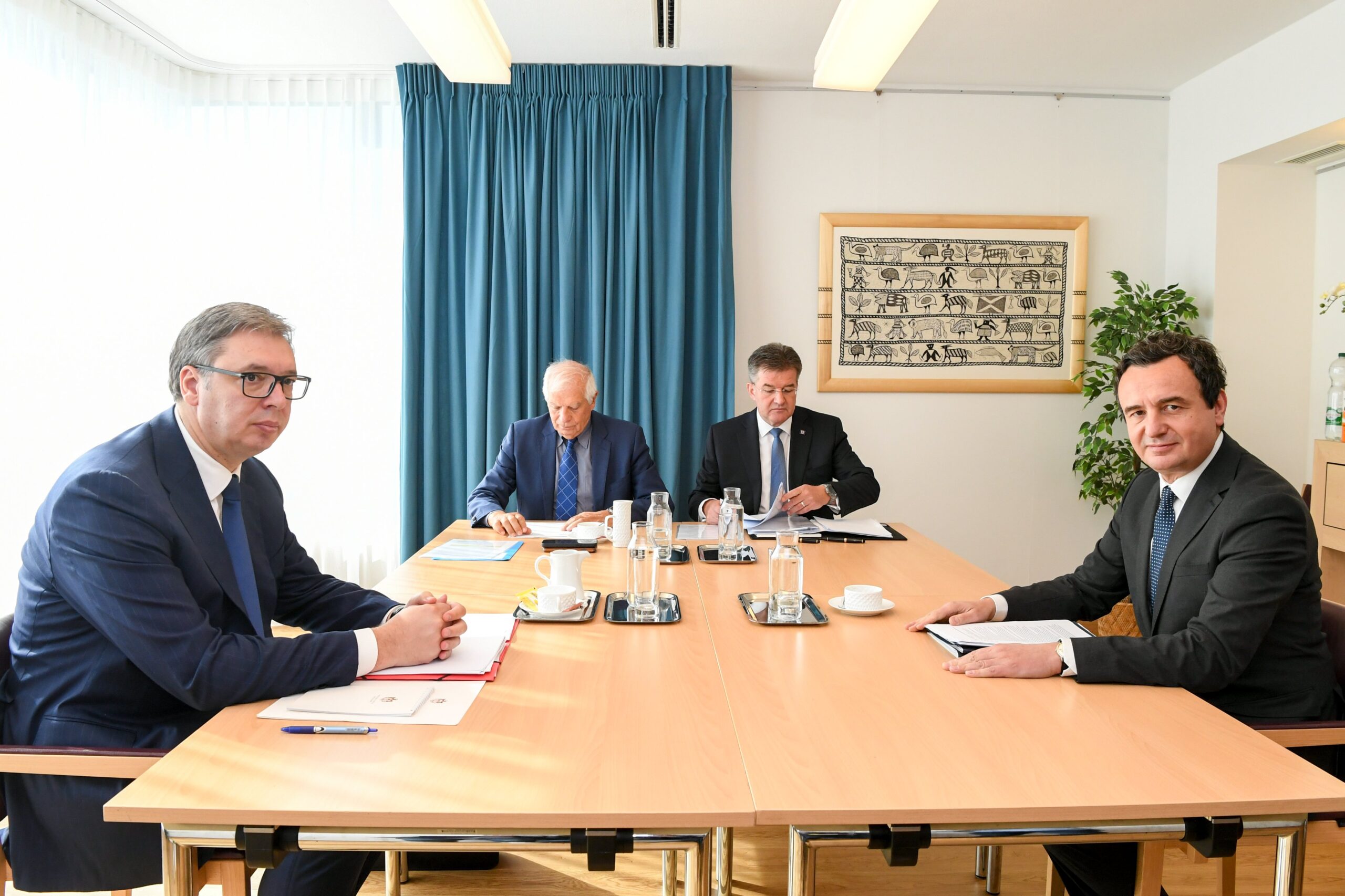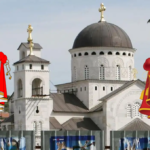Serbian President Aleksandar Vučić and Kosovo Prime Minister Albin Kurti completed their talks in Brussels, mediated by EU High Representative for Foreign Affairs Josep Borrell and EU Special Envoy for Belgrade-Pristina Dialogue Miroslav Lajčak. Vučić and Kurti last met in Brussels on May 2 after Serb-boycotted early local elections in northern Kosovo, in which Albanian mayors of Serb-majority municipalities were elected.
After the talks ended, Kosovo Prime Minister Albin Kurti said the meeting in Brussels had not yielded any results because Serbia had put forward conditions, supported by the EU’s dialogue representative Miroslav Lajčak, to first form the Union of Municipalities with a Serbian Majority (SMU) as a precondition for the implementation of other agreements. Kurti said that President Vučić did not put forward any proposals, which is why the meeting saw no results, adding that there cannot be a compromise between the proposal for the order of steps in the implementation of the Brussels and Ohrid agreements and the old condition – the creation of the SMU. “When I asked to see Serbia’s proposal, as I was told it existed, the mediators could not find it and only after the meeting ended did they give me a two-page paper in English and Cyrillic, which was prepared at least six months ago. It was a document that stipulated that the Serbian-majority SMU should be formed, and then we can move on to the main agreement. I was forced to tell Borell and Lajčak that they were not there in April 2013 when Ashton, Cooper, Taci and Dacic were in the meeting room. Article 10 of the (Brussels) basic agreement refers to the implementation of all binding and valid agreements, of which there are 39. But you cannot choose one and put it like a cart before a horse. Therefore, I did not accept such a condition. It is a shame that Lajčak accepted such a condition from Serbia, violating the function of a mediator,” Kurti said. However, he confirmed his readiness to apply the Brussels and Ohrid agreements without any preconditions.
The President of Serbia, Aleksandar Vučić, following talks said that the meeting had completed with no success. “As for the process itself, it is logical that everyone fights for their own interests. It is clear that Kurti avoids the formation of SMU. Serbia is not running away from its obligations, but we said the same thing as the EU, how everything should happen. We accepted the mediator’s offer of compromise, even though it was not easy for us, and Kurti refused, and that was the end of it.” The Serbian side believes that Kurti never gave a positive answer to the formation of the SMU, whenever he was asked, instead constantly putting forward his own conditions. It has been stated that Kosovo now sees 50 times more incidents than under any previous administration in Pristina. “Serbia demonstrated constructiveness and willingness to compromise. Peace is the most important thing and in the interests of both Serbs and Albanians,” Vučić said, recalling that he raised the issue of illegal expropriation of property and eviction of Serbs from institutions and workplaces. He recalled that the compromise proposal provided for the formation of the SMS first, and then its implementation commitments by Serbia, but since Kurti was not willing to accept it, the talks yielded no positive results.
The head of European diplomacy, Josep Borrell, said after a new round of dialogue between Belgrade and Pristina that without the normalization of relations, there will be no European future for either Kosovo or Serbia, noting that the formation of the SMU is a key element in this process. After a joint meeting with Serbian President Vučić and Kosovo Prime Minister Kurti, Borrell said the European path of both sides depends on dialogue and that Kosovo and Serbia risk falling behind while other partners from the region move toward Europe. Borrell stressed he would inform EU members about the outcome of the meeting and will decide on further steps. He said Kurti insisted on de facto recognition of Kosovo as the first step in the implementation of the Agreement on the Road to Normalization between Kosovo and Serbia, while Vučić accepted the EU’s compromise offer, adding that despite great efforts, differences have not been overcome. Borrell said that six months after the Ohrid agreement between Vučić and Kurti, implementation of the most important points of the Agreement on the path to normalization between Kosovo and Serbia has not yet started, which is unfortunate.
US Deputy Assistant Secretary of State Gabriel Escobar stated that Kosovo Prime Minister Albin Kurti was not going to present the draft charter of the SMU in the north of Kosovo at the meeting held in Brussels. In fact, he committed only to attend the meeting and nothing beyond that. The US asked Kosovo and Serbia ahead of the September 14 talks in Brussels to make specific commitments regarding the agreement on normalization between the two sides, as well as its annex, Escobar said, noting that the consequences of Kosovo and Serbia missing the opportunity to normalize relations are already visible. He added that the European Union wants to see clear signals of interest in the implementation of the Agreement on the Road to Normalization as it considers how far Serbia has progressed in the process of accession to the EU. He also noted that the US is concerned about the lack of coordination in Kosovo regarding the withdrawal of special police units, the expropriation and the scheduled eviction of some institutions led by Serbs from government buildings. Escobar denied accusations that the international community is pursuing a policy of appeasement towards Serbia and is trying win its favor at the expense of the neighbors. Escobar says such a thesis is wrong because the US accepted and recognized the results of the elections in Kosovo – despite the turnout of only three percent, agreed to the creation of local authorities and election of mayors, welcomed Kosovo’s application for membership in the Council of Europe and the introduction of visa liberalization, and imposed sanctions on the head of the Serbian Security and Information Agency Vulin.
Thus, it should be noted that tensions started growing in the north of Kosovo late May, when the newly elected mayors, with the help of the ethnic Albanians, entered the municipal buildings, assisted by police forces – the move opposed by the local Serbs that led to major clashes. After the EU imposed sanctions on Kosovo, an agreement was reached in Bratislava on steps to calm tensions, and one part of this deals included setting up new elections in the north of Kosovo, in particular in Zvečana, Leposaviča, Zubin Potok, and North Mitrovica. The President of Serbia and the Prime Minister of Albania arrived at the meeting in Brussels carrying positions pre-agreed by their political elites. Despite official pressure from Brussels and Washington, Kurti snubbed the proposed compromise solutions. Instead, he put forward his own settlement plan, which he published on social media for greater publicity, playing the card of Pristina contributing its constructive vision to solving the problematic issues, at the same time claiming that Belgrade had not. But this plan did not provide for the fulfillment of the prerequisite for the creation of the Union of municipalities where the Serbs form a majority of the population, therefore, despite its complexity, it was not accepted by either the Serbian side or European mediators. But Kurti accused precisely them of not being constructive so he retained his initial opinion. Although all parties quite calmly commented on the ineffectiveness of talks between Belgrade and Pristina in Brussels, one should expect the reaction on the part of the EU and the US to the actions of Albin Kurti, and an increase in pressure on the top official. It seems the prime minister is deliberately going for a certain aggravation of relations, defending his position, hoping that perhaps Brussels and Washington will change their vision. But this is just as unrealistic as his previous statement that Greece is ready to recognize Kosovo’s independence.



